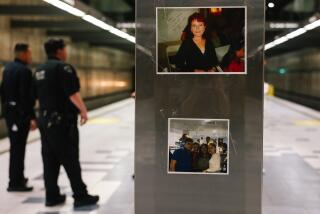The brave cabbie of Baghdad
- Share via
BAGHDAD — Still mourning the death of her husband, Marani Oranis navigated the treacherous streets in her makeshift taxicab, chauffeuring students and workers past bombed-out buildings and armed checkpoints in her 1990 Oldsmobile to earn enough to support her daughters.
It was a path that brought Oranis, a former scientist for Iraq’s Agriculture Ministry, into the cross hairs of a Western security convoy Tuesday afternoon along a main road in Baghdad’s Karada district. The guards opened fire, apparently perceiving her and a passenger as a threat, and sealing her fate as another casualty amid the heated international debate over the use of private armed guards in a war zone.
Oranis and her passenger, Geneva Jalal, 30, were shot and killed by guards from Unity Resources Group, an Australian-run firm based in Dubai, United Arab Emirates. Unity Resources was hired to protect U.S. contractors aiding Iraq’s reconstruction.
Witnesses said Oranis’ car failed to heed warning signals to yield to the convoy, which first fired a warning shot into her radiator. When the car continued to advance, two guards fired.
On Wednesday, about 100 of Oranis’ family members and friends gathered at an Armenian community hall to mourn her death and vent their anger over the perceived impunity with which foreign security contractors threaten, and sometimes kill, Iraqi citizens. The incident occurred less than a month after guards with private security firm Blackwater USA killed as many as 17 civilians in Nisoor Square, an incident that triggered outrage by the Iraqi government and demands for $8 million in compensation for the families of each person killed.
“We want to know why this happened,” said her brother, Albert Manook, 55. “Didn’t they see they were only women? Couldn’t they distinguish?” He broke down in tears.
Mourners sat on plush couches in the gathering hall as waiters distributed Arabian coffee, water and cigarettes. A preacher gave a sermon, then asked the congregants to stand and pray. They began chanting as smoke from incense rose, giving the hall an ethereal air.
Oranis, who was 48, was born in Basra, the youngest of six brothers and three sisters. She earned a degree in horticulture and agronomy.
She gave up her job at the Agriculture Ministry to raise a family with her husband, Azad, an architectural engineer. Together they had three daughters, Nora, Karon and Alice.
Her family members say her life was overwhelmingly characterized by sympathy and caring for others, including attending to both her mother and father in their final years.
Manook said she cooked and cleaned for him when she visited him in Basra a month ago, while attending a relative’s funeral.
Two years ago, Oranis’ husband died after heart bypass surgery. He did not work for the government and had no pension, leaving Oranis with little.
With Iraq ravaged by war and her degree and agricultural expertise years out of date, she took up chauffeuring students and workers to their schools and jobs, to make enough to care for her daughters. Nora, 20, and Karon, 18, were both in university -- Nora studying architecture, and Karon pursuing biological studies. Alice is 13.
Oranis was dressed in black when she was shot, garb that her niece said showed she was still mourning her husband.
“She was forced to traverse the roads of Baghdad on a daily basis in order to provide for her daughters,” said the niece, Lida Sarkis, 40.
“This turn of fate is something that every single one of us Iraqis expects on a daily basis,” Sarkis said.
“We are all targets for elimination, leaving for work and school in the mornings and not knowing whether we will make it back home safely.”
After the sermon, family members struggled with the shock of losing Oranis so suddenly and violently.
“I would just want to know the person who shot her, to know what went in his mind,” said her brother, Paul Manook, 57, who spoke by telephone from London, where he is an electrical engineer. “Has he ever thought of family, or anything human?”
“Once the investigation is over, I would like to see them punished accordingly with the Torah and the other monotheistic scriptures which specifically state, ‘An eye for an eye and tooth for a tooth,’ ” Albert Manook said.
Family members knew little of Jalal and assumed she was one of Oranis’ clients.
Father Vazken Movsesian of St. Peter Armenian Church in Glendale, who is the executive director of a ministry that works with Armenian refugees, said the deaths would resonate with Southern California Armenians, some of whom emigrated from Iraq.
“We have a large Armenian community from Iraq, and a lot of these people are now displaced because of the war. It’s going to rekindle a lot of the hurt that they’ve been feeling over the last few years,” he said.
Lethal hazards fill Baghdad’s chaotic streets. Every unattended vehicle arouses suspicion as a potential car bomb. Every speeding vehicle strikes pangs of fear of a suicide attack. Every moment stuck in traffic or at a checkpoint means being exposed to a potential assault.
--
christian.berthelsen@latimes.com
More to Read
Sign up for Essential California
The most important California stories and recommendations in your inbox every morning.
You may occasionally receive promotional content from the Los Angeles Times.













